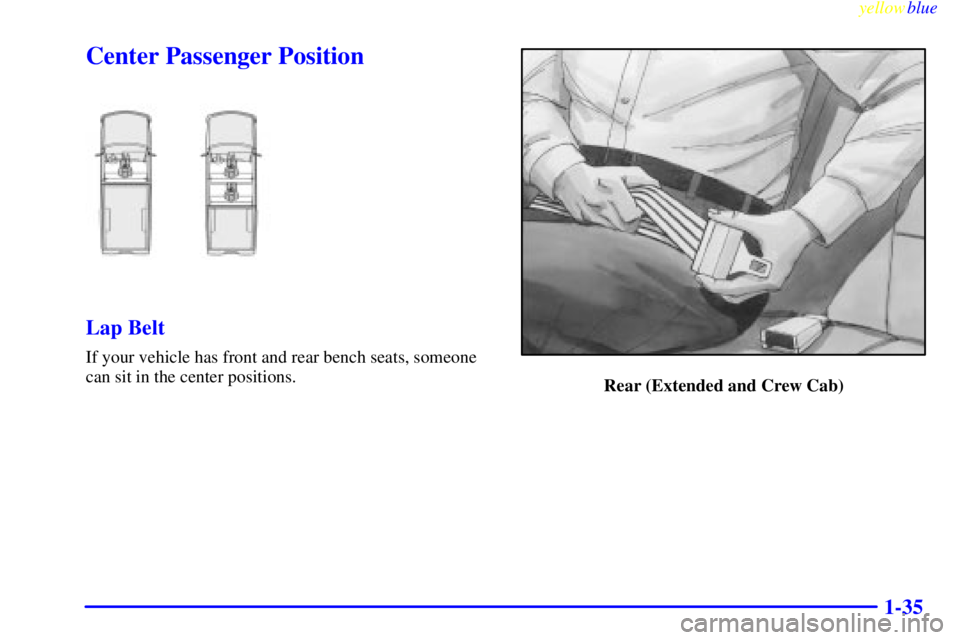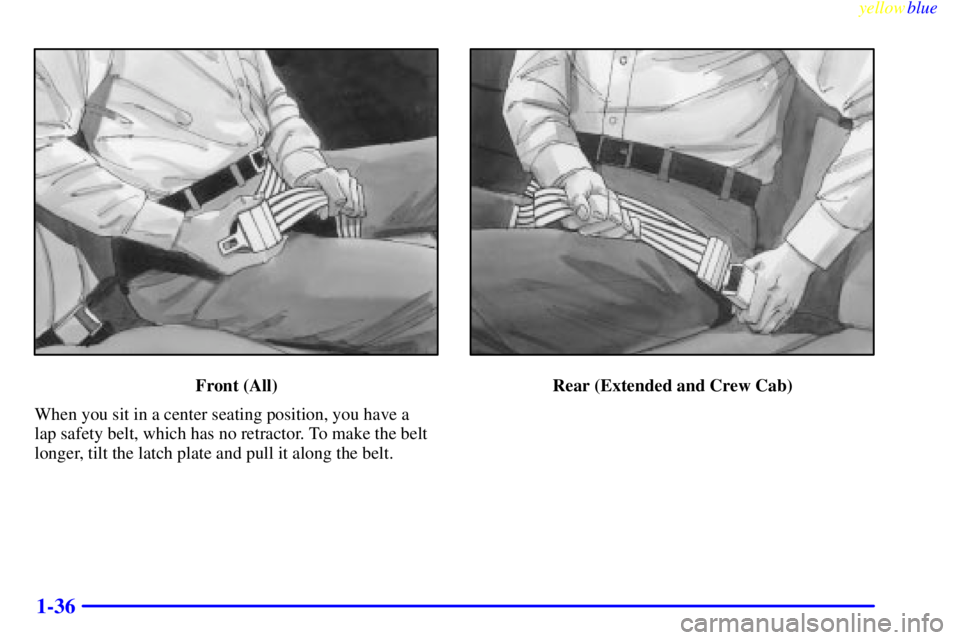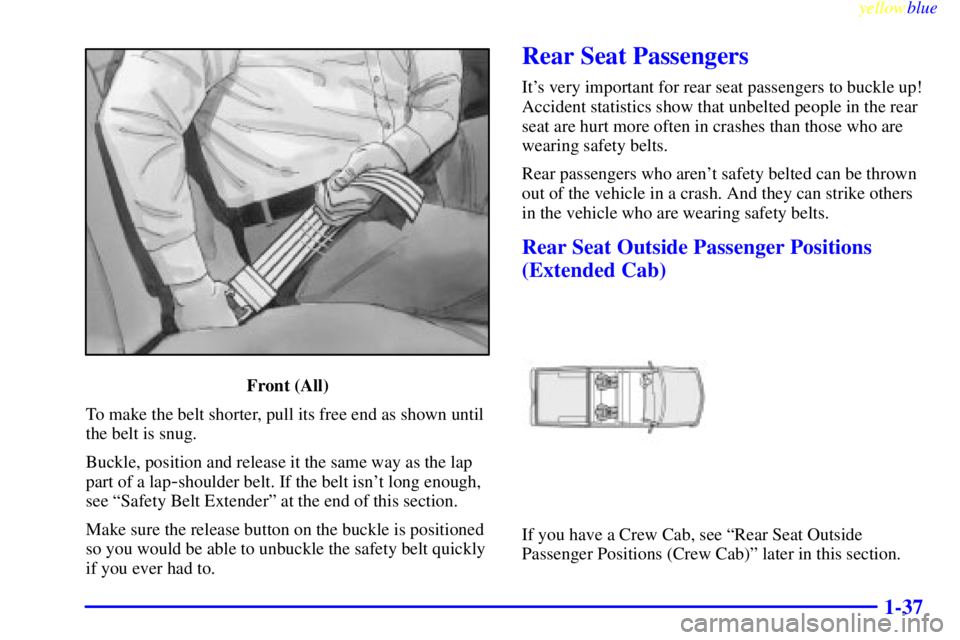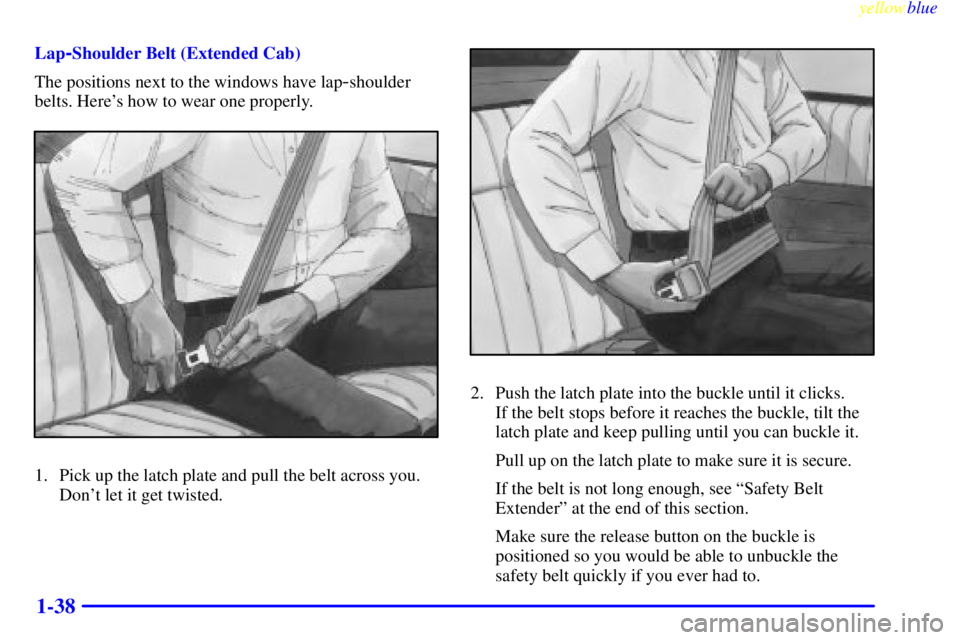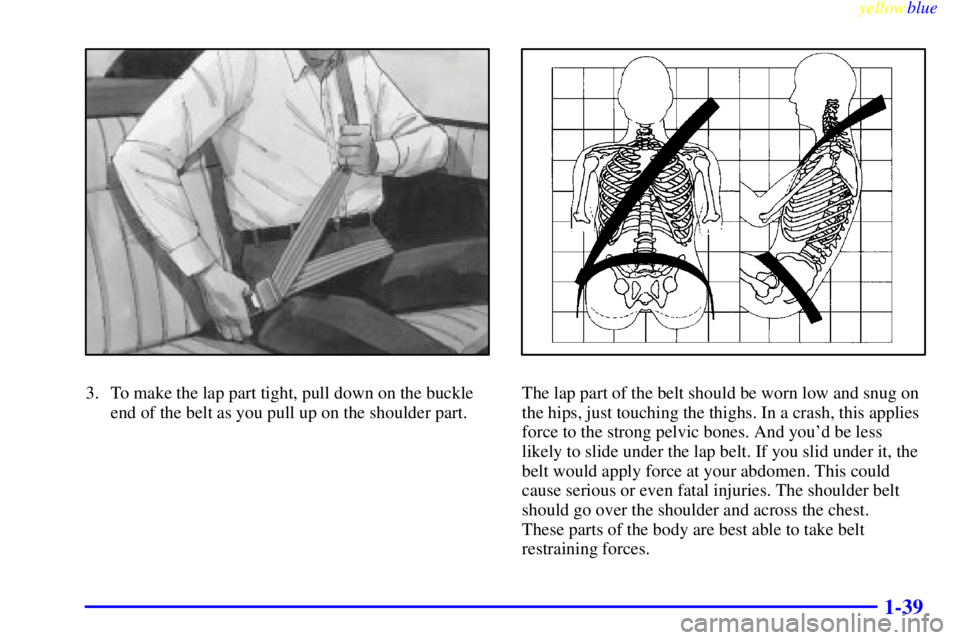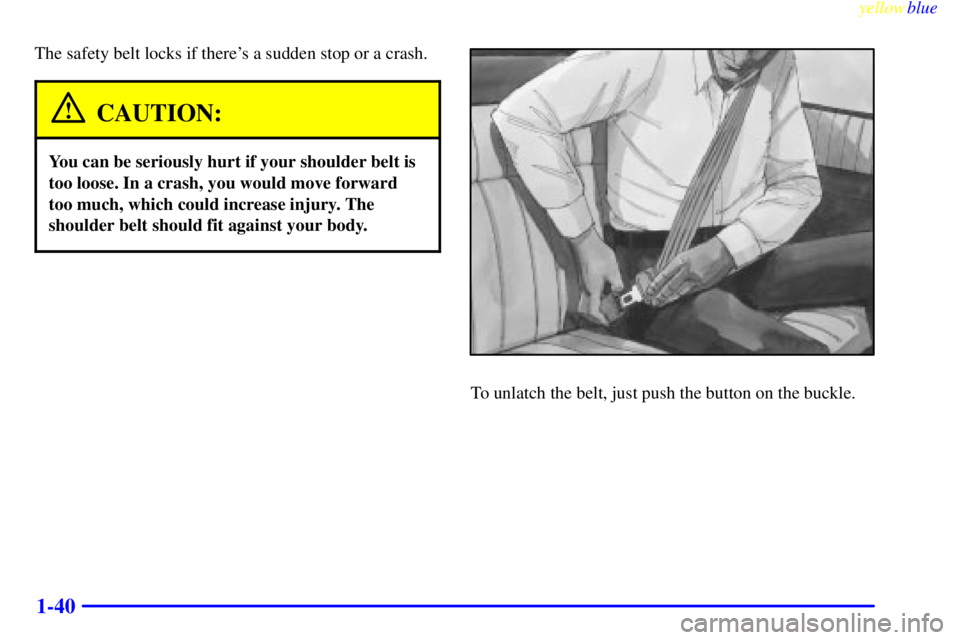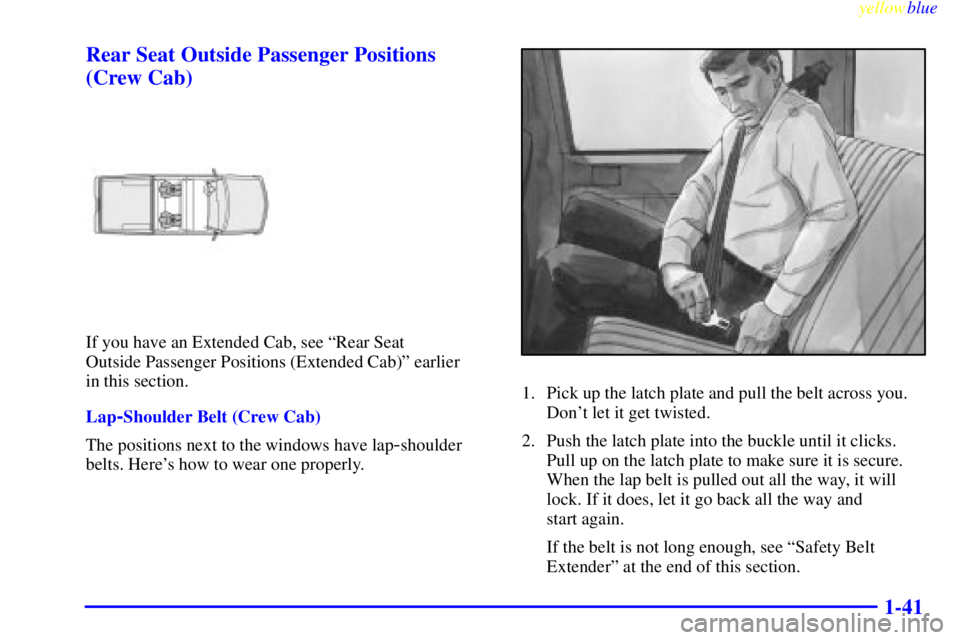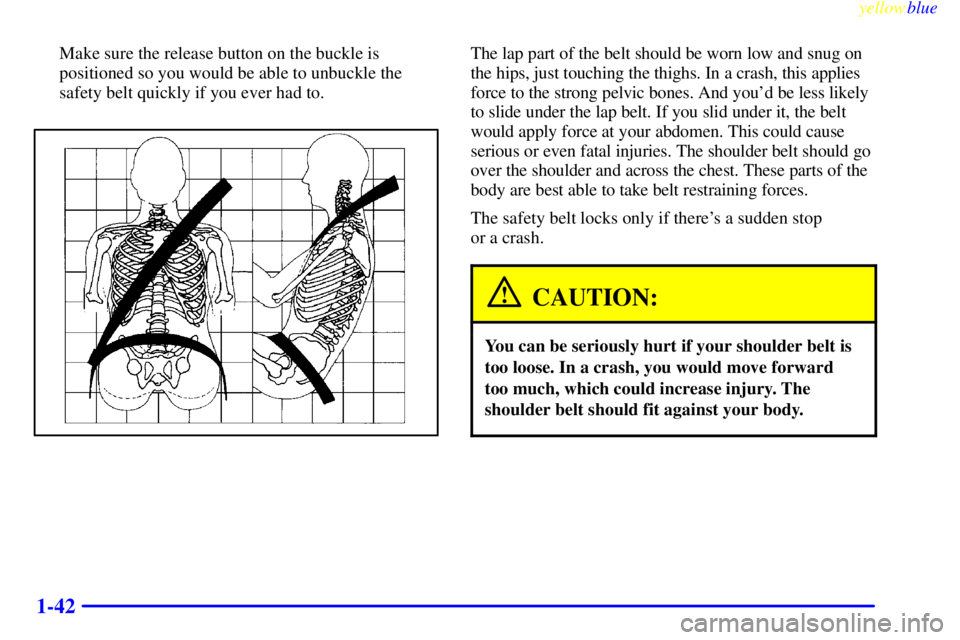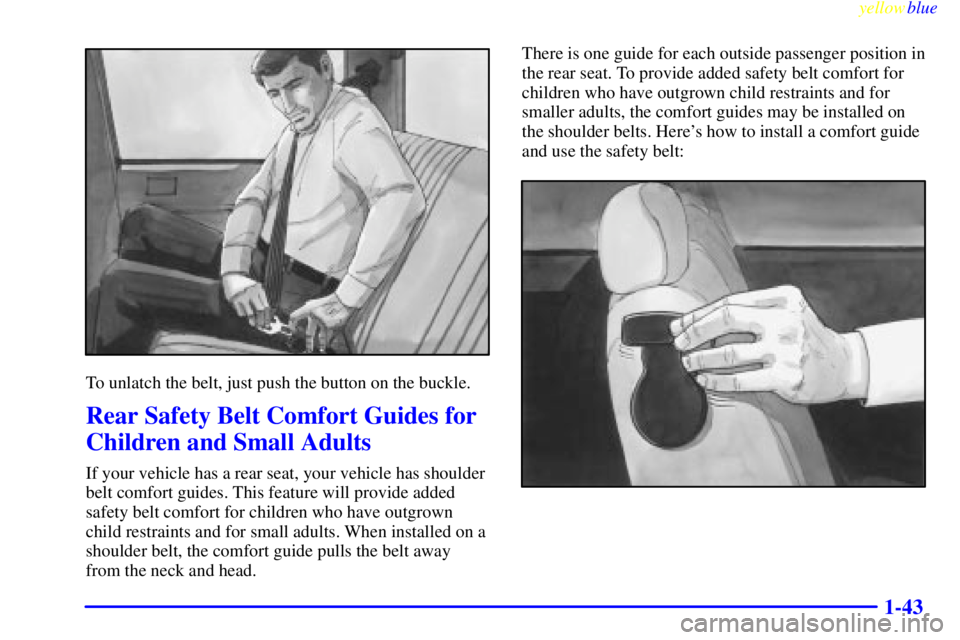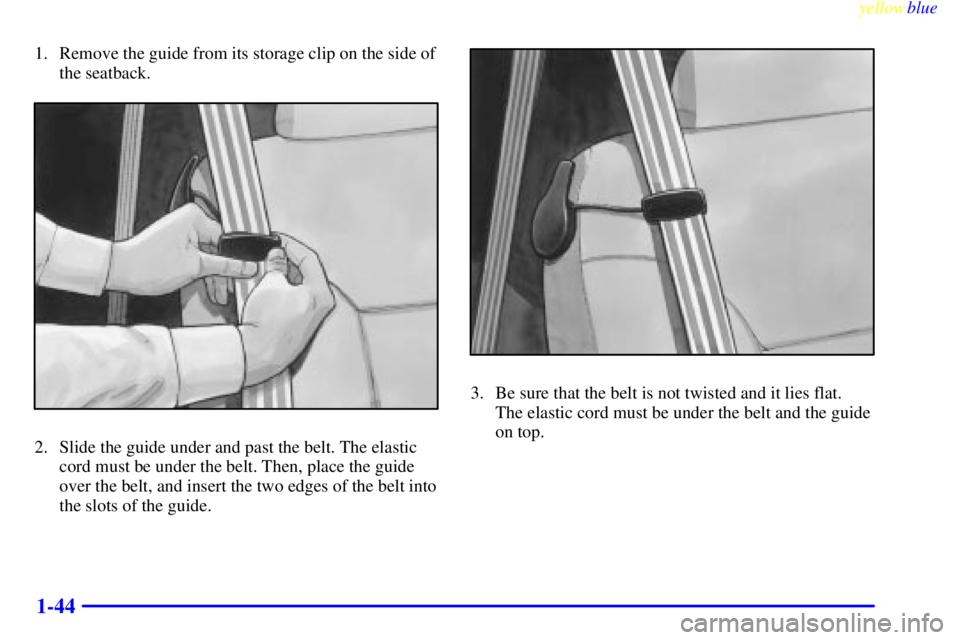GMC SIERRA 1999 Service Manual
Manufacturer: GMC, Model Year: 1999,
Model line: SIERRA,
Model: GMC SIERRA 1999
Pages: 440, PDF Size: 2.94 MB
GMC SIERRA 1999 Service Manual
SIERRA 1999
GMC
GMC
https://www.carmanualsonline.info/img/44/35605/w960_35605-0.png
GMC SIERRA 1999 Service Manual
Trending: oil capacity, fold seats, seat adjustment, CD player, check oil, door lock, reset
Page 41 of 440
yellowblue
1-35
Center Passenger Position
Lap Belt
If your vehicle has front and rear bench seats, someone
can sit in the center positions.
Rear (Extended and Crew Cab)
Page 42 of 440
yellowblue
1-36
Front (All)
When you sit in a center seating position, you have a
lap safety belt, which has no retractor. To make the belt
longer, tilt the latch plate and pull it along the belt.Rear (Extended and Crew Cab)
Page 43 of 440
yellowblue
1-37
Front (All)
To make the belt shorter, pull its free end as shown until
the belt is snug.
Buckle, position and release it the same way as the lap
part of a lap
-shoulder belt. If the belt isn't long enough,
see ªSafety Belt Extenderº at the end of this section.
Make sure the release button on the buckle is positioned
so you would be able to unbuckle the safety belt quickly
if you ever had to.
Rear Seat Passengers
It's very important for rear seat passengers to buckle up!
Accident statistics show that unbelted people in the rear
seat are hurt more often in crashes than those who are
wearing safety belts.
Rear passengers who aren't safety belted can be thrown
out of the vehicle in a crash. And they can strike others
in the vehicle who are wearing safety belts.
Rear Seat Outside Passenger Positions
(Extended Cab)
If you have a Crew Cab, see ªRear Seat Outside
Passenger Positions (Crew Cab)º later in this section.
Page 44 of 440
yellowblue
1-38
Lap-Shoulder Belt (Extended Cab)
The positions next to the windows have lap
-shoulder
belts. Here's how to wear one properly.
1. Pick up the latch plate and pull the belt across you.
Don't let it get twisted.
2. Push the latch plate into the buckle until it clicks.
If the belt stops before it reaches the buckle, tilt the
latch plate and keep pulling until you can buckle it.
Pull up on the latch plate to make sure it is secure.
If the belt is not long enough, see ªSafety Belt
Extenderº at the end of this section.
Make sure the release button on the buckle is
positioned so you would be able to unbuckle the
safety belt quickly if you ever had to.
Page 45 of 440
yellowblue
1-39
3. To make the lap part tight, pull down on the buckle
end of the belt as you pull up on the shoulder part.The lap part of the belt should be worn low and snug on
the hips, just touching the thighs. In a crash, this applies
force to the strong pelvic bones. And you'd be less
likely to slide under the lap belt. If you slid under it, the
belt would apply force at your abdomen. This could
cause serious or even fatal injuries. The shoulder belt
should go over the shoulder and across the chest.
These parts of the body are best able to take belt
restraining forces.
Page 46 of 440
yellowblue
1-40
The safety belt locks if there's a sudden stop or a crash.
CAUTION:
You can be seriously hurt if your shoulder belt is
too loose. In a crash, you would move forward
too much, which could increase injury. The
shoulder belt should fit against your body.
To unlatch the belt, just push the button on the buckle.
Page 47 of 440
yellowblue
1-41 Rear Seat Outside Passenger Positions
(Crew Cab)
If you have an Extended Cab, see ªRear Seat
Outside Passenger Positions (Extended Cab)º earlier
in this section.
Lap
-Shoulder Belt (Crew Cab)
The positions next to the windows have lap
-shoulder
belts. Here's how to wear one properly.
1. Pick up the latch plate and pull the belt across you.
Don't let it get twisted.
2. Push the latch plate into the buckle until it clicks.
Pull up on the latch plate to make sure it is secure.
When the lap belt is pulled out all the way, it will
lock. If it does, let it go back all the way and
start again.
If the belt is not long enough, see ªSafety Belt
Extenderº at the end of this section.
Page 48 of 440
yellowblue
1-42
Make sure the release button on the buckle is
positioned so you would be able to unbuckle the
safety belt quickly if you ever had to.The lap part of the belt should be worn low and snug on
the hips, just touching the thighs. In a crash, this applies
force to the strong pelvic bones. And you'd be less likely
to slide under the lap belt. If you slid under it, the belt
would apply force at your abdomen. This could cause
serious or even fatal injuries. The shoulder belt should go
over the shoulder and across the chest. These parts of the
body are best able to take belt restraining forces.
The safety belt locks only if there's a sudden stop
or a crash.
CAUTION:
You can be seriously hurt if your shoulder belt is
too loose. In a crash, you would move forward
too much, which could increase injury. The
shoulder belt should fit against your body.
Page 49 of 440
yellowblue
1-43
To unlatch the belt, just push the button on the buckle.
Rear Safety Belt Comfort Guides for
Children and Small Adults
If your vehicle has a rear seat, your vehicle has shoulder
belt comfort guides. This feature will provide added
safety belt comfort for children who have outgrown
child restraints and for small adults. When installed on a
shoulder belt, the comfort guide pulls the belt away
from the neck and head.There is one guide for each outside passenger position in
the rear seat. To provide added safety belt comfort for
children who have outgrown child restraints and for
smaller adults, the comfort guides may be installed on
the shoulder belts. Here's how to install a comfort guide
and use the safety belt:
Page 50 of 440
yellowblue
1-44
1. Remove the guide from its storage clip on the side of
the seatback.
2. Slide the guide under and past the belt. The elastic
cord must be under the belt. Then, place the guide
over the belt, and insert the two edges of the belt into
the slots of the guide.
3. Be sure that the belt is not twisted and it lies flat.
The elastic cord must be under the belt and the guide
on top.
Trending: wheel size, high beam, clutch, parking brake, recommended oil, center console, run flat
